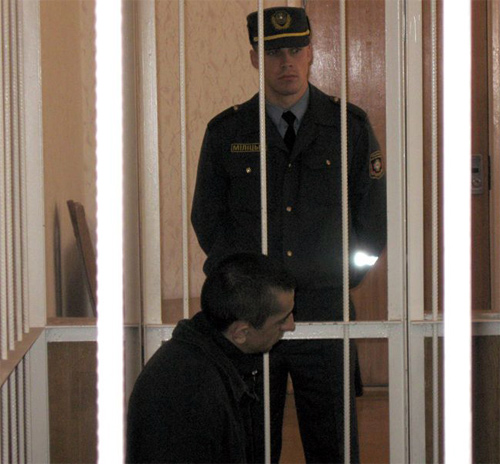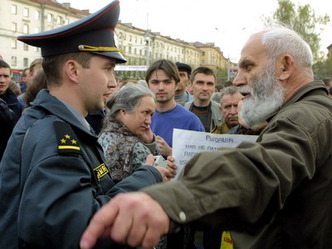At the beginning of the document human rights (HR) defenders acknowledge some positive developments with regard to the situation with torture in Belarus. Nevertheless, defenders say that they are “greatly concerned about torture and other ill-treatments in our country especially those that are related to functioning of public institutions such as police and prisons.”
“Our report contains some objective criticism of the state, whose purpose was to comprehensively show the existing problems as a biased investigation into cases of torture or inadequate conditions of detention in penal institutions of Belarus. However, we are willing to work with prosecutors, police and other government agencies to solve these problems, as at the legislative and enforcement level, “said human rights activist Sergei Ustinov.
 “This report analyzes in detail the problem of torture and lack of effective investigations into allegations of torture and cruel, inhuman or degrading treatments or punishments,” the introduction says.
“This report analyzes in detail the problem of torture and lack of effective investigations into allegations of torture and cruel, inhuman or degrading treatments or punishments,” the introduction says.
International standards disregarded
Also in the introduction HR defenders emphasize several points important for understanding the overall picture of the human rights situation in Belarus. They stress the lack of response by the official institutions to reports of torture and ill-treatment as well as its application to adolescent minors. They point out a prevailing practice of courts to disregard international standards favouring the national legislation, even in the cases where Belarus is a signatory to several binding treaties.
 The report, which represents a full picture of Belarusian realities, is divided into two parts. The first is devoted to new instances of use (and more often non-use) of the UN Convention. The second part stipulates measures taken to implement the UN recommendations. Further, HR defenders give their advice and guidance on compliance with international requirements.
The report, which represents a full picture of Belarusian realities, is divided into two parts. The first is devoted to new instances of use (and more often non-use) of the UN Convention. The second part stipulates measures taken to implement the UN recommendations. Further, HR defenders give their advice and guidance on compliance with international requirements.
“This report is a reaction of the human rights defenders to the fourth periodical report that was presented by Belarus to UN for the last 10 years and covers many aspects of law-enforcement activities and the prosecutorial supervision,” Enira Branitskaya, right, HR defender, explained.
To torture or not to torture? – That is not the question!
In order to demonstrate which place torture occupies in Belarus, the HR defenders establish right from the outset of their report that: “No legislative act of Belarus does contain a definition of “torture” as stipulated in the UN Convention.” What is torture and how to investigate it, when it is not clear what it is and what its criteria are? Citing some regulations and facts from the Belarusian legislation, the report concludes that “the state does not understand or does not want to understand the definition of “torture” as classified by Article 1 of the UN Convention.”
The report calls into question remarks of the official Minsk about thorough investigations into all cases of torture and inhuman treatments. The report authors have a clearly different point of view, supported by concrete facts and actual names, which are given in the text.
 The attention is also focused on running and operating detention centres: they do not meet even minimal requirements; they are harmful to both mental and physical health of prisoners. The report provides atrocious statistics: “As a consequence, the incidence of tuberculosis in Belarusian prisons exceeds the national average in 6.7 times. In 2008 the rate of tuberculosis among prisoners amounted to 303.6 cases per 100,000 people, and 45.3 cases for the general population.”
The attention is also focused on running and operating detention centres: they do not meet even minimal requirements; they are harmful to both mental and physical health of prisoners. The report provides atrocious statistics: “As a consequence, the incidence of tuberculosis in Belarusian prisons exceeds the national average in 6.7 times. In 2008 the rate of tuberculosis among prisoners amounted to 303.6 cases per 100,000 people, and 45.3 cases for the general population.”
Experts recommend
Having analyzed all instances and specific cases, HR defenders provide their recommendations to improve the situation yet again. The main emphasis is made on the need to define torture in legal terms and to transparently and accurately describe the degree of responsibility for this crime. It is very important that “urgent and effective measures made to establish a fully independent complaints mechanism for citizens.”
The report also points out conditions of Belarusian prisons. They have to be immediately improved, as they are not just bad, but critical.
 Separately, the report emphasizes a need to ensure the independence of the judiciary and its accountability to the law and citizens. Meaning it is necessary to change the entire judicial system in Belarus, to completely eradicate the existing one. However, it is absolutely clear that such radical changes cannot occur today. Thus, the UN Committee will make new warning requirements to the country, giving more work for the Belarusian human rights defenders.
Separately, the report emphasizes a need to ensure the independence of the judiciary and its accountability to the law and citizens. Meaning it is necessary to change the entire judicial system in Belarus, to completely eradicate the existing one. However, it is absolutely clear that such radical changes cannot occur today. Thus, the UN Committee will make new warning requirements to the country, giving more work for the Belarusian human rights defenders.
Belarusian HRH
Documents:
- Report on torture
Report of Belarusian non-governmental organizations and human rights defenders on implementation by the Republic of Belarus
of the Convention Against Torture and Other Cruel, Inhuman or Degrading Treatment or Punishment


